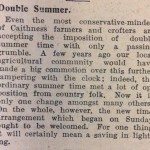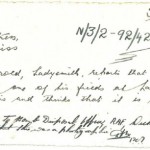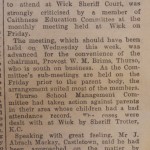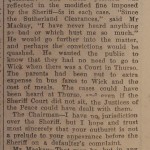The Japanese invasion of the Philippines intensified this week with further landings and the capture of the Bataan peninsula; on 9 April some 65,000 captured American and Filipino soldiers were sent on the infamous “Bataan death march” to captivity, during which 11,000 died. On 8 April the RAF mounted one of the largest bombing raids of the war, with over 270 bombers.
The John O’Groat Journal this week printed a photograph of the Spitfire “Caithness”, paid for by donations from the county, with one of the pilots seated in the cockpit. “’Caithness’ has already done fine work,” the paper added, “and the good wishes of all go with her daring pilots wherever they go.”
 The clocks had just gone forward, heralding the start of double summer time. ‘Norseman’ in his column in the Groat observed that “even the most conservative-minded of Caithness farmers and crofters were accepting the imposition of double summer time with only passing grumble.” Double summer time had begun in 1940, when the clocks had not been put back an hour in the autumn; when the clocks next went forward in the following spring Britain was therefore two hours ahead of Greenwich Mean Time. As Norseman observed, “On the whole, however, the new time arrangement which began on Sunday ought to be welcomed. For one thing it will certainly mean a saving in lighting.”
The clocks had just gone forward, heralding the start of double summer time. ‘Norseman’ in his column in the Groat observed that “even the most conservative-minded of Caithness farmers and crofters were accepting the imposition of double summer time with only passing grumble.” Double summer time had begun in 1940, when the clocks had not been put back an hour in the autumn; when the clocks next went forward in the following spring Britain was therefore two hours ahead of Greenwich Mean Time. As Norseman observed, “On the whole, however, the new time arrangement which began on Sunday ought to be welcomed. For one thing it will certainly mean a saving in lighting.”

Meanwhile, Caithness farmers continued to turn up unidentified objects in their fields, some of which turned out to be harmless. Miss Bain, postmistress at Reiss, notified the police on 6 April: “Mr Harrold, Ladysmith, reports that a bomb has fallen in one of his fields at Ladysmith. He can see the fins and thinks that it is unexploded.” A note on the report adds that the RAF bomb disposal officer from Wick was notified, “and he reported later that this was a photographic flash.”
 Finally this week, the John O’Groat Journal reported a debate at the Education Committee
Finally this week, the John O’Groat Journal reported a debate at the Education Committee  over the summoning to Wick Sheriff Court of parents of children from Thurso who had not attended school regularly. One member declared, “The poor people who are humiliated enough by going to any Court have to go to the Sherriff Court at Wick.” He added with pardonable warmth: “Since the Sutherland Clearances, I have never heard anything so bad or which hurt me so much.” The Sheriff seems to have treated the parents leniently, imposing a fine of five shillings each.
over the summoning to Wick Sheriff Court of parents of children from Thurso who had not attended school regularly. One member declared, “The poor people who are humiliated enough by going to any Court have to go to the Sherriff Court at Wick.” He added with pardonable warmth: “Since the Sutherland Clearances, I have never heard anything so bad or which hurt me so much.” The Sheriff seems to have treated the parents leniently, imposing a fine of five shillings each.
